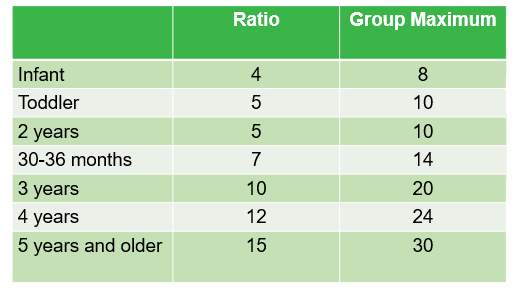What Type of Care is the Best Fit for You?
Licensed Child Care Home, Licensed Child Care Center, Unlicensed Registered Ministry
Licensed Child Care Home:
A child care home means is residential structure in which at least six (6) children (not including the children for whom the provider is a parent, stepparent, guardian, custodian, or other relative or any child who is at least fourteen (14) years of age and does not require child care) at any time receive child care from a provider:
- while unattended by a parent, legal guardian, or custodian
- for regular compensation
- for more than 4 hours but less than 24 hours in each of 10 consecutive days per year, excluding intervening Saturdays, Sundays, and holidays.
Education required:
All applicants must have a high school diploma/transcript or a high school equivalency certificate from an accredited high school by the date of licensure. A Child Development Associate credential or achievement of a similar program, such as an Associate Degree in Early Childhood, approved by the division is required for the applicant at each licensed home within 3 years of licensure. For more information, please visit their website at www.cdacouncil.org. If you do not have a current CDA, you have 3 years from the date of licensure to complete this. If you have some credit hours in Early Childhood Education at an accredited college/university, they may count toward this credential, allowing you 3 years to obtain the rest of the needed requirements.
Ratios for Child Care Homes:
- Infants (birth to 12 months) – 4:1
- Infant/Toddler Mixed (birth through 24 months) 6:1
- Mixed-Age Groups (birth to 6 years) – 10:1 Only 3 children can be less than 16 months. Seven of the children must be 16 months of age and walking unassisted.
- Preschool and older (3 years and older ONLY) – 12:1




Licensed Child Care Center:
In Indiana, a child care center is defined as a non-residential building where at least one child receives child care from a provider while unattended by a parent, guardian, or custodian; for regular compensation; and for more than 4 hours but less than 24 hours in each of 10 consecutive days per year, excluding intervening Saturdays, Sundays and holidays.
Director Qualifications:
All directors must be at least 21 years old, be present on-site for a minimum of 30 hours per week, and have a higher education degree from an accredited college or university. The director must have either a:
-
- Bachelor degree in Early Childhood Education or Elementary Education with a Kindergarten endorsement
- Bachelor degree in any field with 15 credit hours related to Early Childhood Education or a Child Development Associate credential (CDA)
- Associate’s degree in Early Childhood Education and a minimum of 3 years of experience in an early childhood program
A qualified director must be identified and on staff prior to opening the center. The child care licensing consultant will review all documents to determine eligibility.
Capacity:
Based on your building size. Toddlers and older: 35 sq ft per child of usable indoor space. Infants: 50 sq ft per child of usable play space.
Ratios:

Unlicensed Registered Ministry:
In Indiana, an unlicensed registered ministry is defined as a child care operated by a church or religious ministry that is a religious organization exempt from federal income taxation under Section 501 of the Internal Revenue Code.










